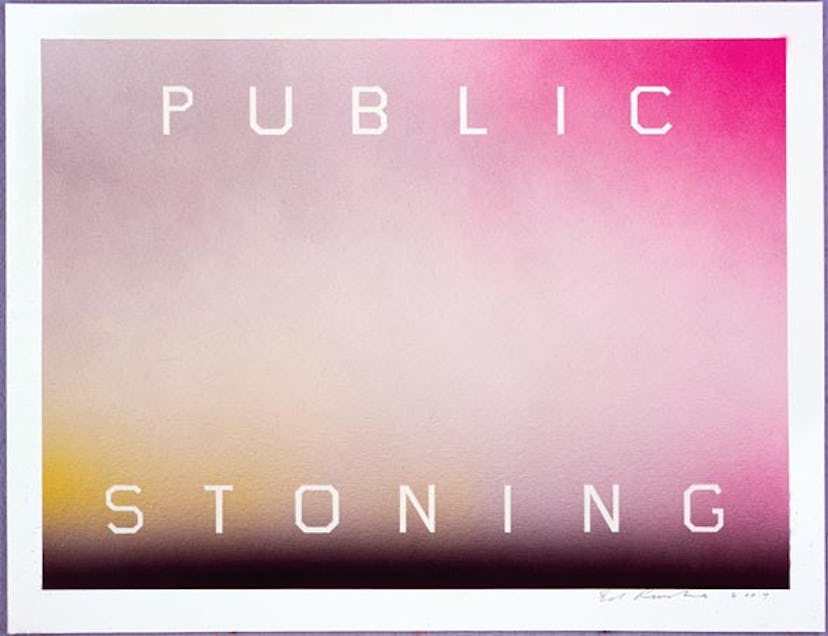They say that one mark of great writers is their ability to spin personal trauma into creative gain, which usually means a transmuting of pain into prose. But in the wake of his berating on The Oprah Winfrey Show, James Frey had an altogether different notion. With the help of his friend Sarah Watson, a gallery director at Gagosian Gallery Beverly Hills, the author of A Million Little Pieces reached out to Ed Ruscha about a possible commission. He had heard through the grapevine that, in rare instances, the acclaimed artist, known for his laconic use of text in paintings, took on such projects “if the words have character,” as Ruscha puts it.
“Someone told me that my appearance on television reminded them of a public stoning,” recalls Frey, who was excoriated for taking factual liberties with his book, which was marketed as a memoir. “And I thought it was funny. For whatever reason, I immediately thought of Ed Ruscha, and thought it would make a cool Ruscha piece.
“Now it’s on my wall across from a Matthew Barney picture,” Frey continues, sitting in his Amagansett, New York, summer house. “I love it. It does what I want art to do, which is cause an emotional reaction. Sometimes I look at it and it bums me out, sometimes it pisses me off, sometimes I look at it because it’s beautifully executed and I appreciate the virtuosity of it. Most of the time I look at it and laugh. And that’s the best thing, to look at it and laugh.” In Ruscha’s mind, it was the words themselves, and not Frey’s personal association with them, that resonated. “I didn’t care about the particulars of any controversy since I don’t do TV or Oprah,” notes Ruscha, who does count himself a fan of literary lights, including Jack Kerouac and William Burroughs, and has even “sometimes used words, verbatim, from their works.”
After almost two years away from the media’s glare, Frey was back in the news in September, signing a deal with HarperCollins to publish his new novel, Bright Shiny Morning. “I definitely thought about Ruscha, and his work, while I was writing the book,” he says. “There’s one section about L.A. highways that was inspired, largely, by his photos of Sunset Boulevard. There’s another section about art that has an interview with a character very, very, very loosely based on him. Ruscha is one of the few artists to deal with the city in a way that doesn’t have much to do with Hollywood or crime, which is what most people doing work about L.A. seem to focus on.”
Frey’s alliances in contemporary art predate his commission of the Public Stoning piece, and his collection includes works by Damien Hirst, Cecily Brown and David Smith, among others. In 2006 he wrote a short story for one of photographer Malerie Marder’s exhibition catalogs. His next release is an essay for the new Richard Prince bibliography, to be published in December by JMc & GHB editions. “I haven’t gotten around to asking him yet,” says Frey, “but I’d love to have Richard make a picture for me called Talk Show Nurse.” Just don’t expect Ms. Winfrey to sit for the portrait.
